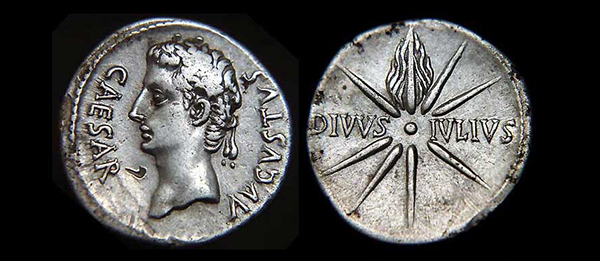
For as long as human beings have existed, surely no part of the natural world has been more enigmatic or influential as the movement of observable celestial objects. Earth’s movement around the sun set the agricultural cycles by which the large majority of humanity lived until our own, very recently arrived, modern era, while the moon’s effect on the ocean’s tides profoundly influenced the day-to-day lives and economies of ancient seafaring nations. In the Greco-Roman world, there is ample evidence that celestial objects, their movements and occasional surprise appearances not only inspired awe and wonder, but in some cases directly influenced mythology, elections, wars and imperial propaganda. Eclipses, comets and meteorites were particularly mentioned by the ancient writers since their appearances were both startling and, for many, utterly unpredictable.1
Comets especially were associated with portents and omens. The superstitious Roman encyclopedist Pliny the Elder held the view that comets were “terrifying apparitions.”2 He went so far as to categorize them by appearance, location and tail direction, with each “type” corresponding to sometimes hilariously specific earthly circumstances, for example, noting that “a comet resembling a flute with its tail rays pointing toward the east would indicate a malefic influence on music in the eastern territories.”3 While we may never know of a specific comet appearance that caused musical mayhem in the eastern empire, we do have a varied range of accounts from ancient authors attesting to other cometary occurrences. One such event played an important role in the dying days of the Roman Republic and was to become part of the powerful blend of mythology and propaganda that helped establish Octavian, Caesar’s great-nephew and heir, as Rome’s first emperor, thus forever changing the political landscape of the Roman world.

Following the death of Julius Caesar, in 44 B.C.E., his great-nephew Octavian (the future emperor Augustus) held a series of public games in honor of his great-uncle in July of that year.4 The move was a savvy one; Octavian was at this time by no means assured of his accession to the political power of his uncle. Mark Antony, a Roman consul and one of Caesar’s most esteemed generals, had also been positioning himself as Caesar’s political heir. By holding public games at his own family’s expense in honor of the assassinated Caesar, Octavian was hoping to not only win over Caesar’s loyal military veterans, but also to raise his own image in the eyes of the Roman citizenry. It was, as the ancient writers tell us, a wild success, largely thanks to the unscheduled appearance of a celestial guest. The Roman historian Suetonius reports that during the course of the games, “a comet [stella crinita] shone throughout seven days in a row, rising at about the 11th hour, and it was believed that it was the soul of Caesar who had been taken up into heaven.”5
The comet, which was evidently bright enough to be seen during the day, was an extremely fortuitous circumstance for both Octavian and for those who were trying to secure a decree from the Roman senate conferring divine status upon Julius Caesar.6 Though there was undoubtedly skepticism on the part of some of the more educated Romans (as well as Octavian’s political opponents), popular opinion was that the sudden appearance of the comet was a celestial omen that signified the late dictator’s apotheosis. It was an opinion that suited Octavian’s aims perfectly; he seized upon the event with alacrity, immediately grasping the value that such an extraordinary event would have as a propaganda device. The political capital inherent in being the heir of a god was substantial, and Octavian lost no time in setting up a bronze statue of Julius Caesar in the Temple of Venus and adorning the head of the statue with a star.7 Indeed, the ancient writers tell us that he later added the symbol to his own helmet—a stratagem no doubt devised to associate himself with his great-uncle’s divinity.8
Two years later, after the Roman senate had issued a decree proclaiming the deified status of Julius Caesar, Octavian began the construction of the Temple of the Divine Julius Caesar in the Roman Forum. The temple, which was built on the site of Caesar’s cremation, was also called the Temple of the Comet Star; it was the only temple dedicated to the cult of the comet.9 Coinage depicting the deified Julius Caesar with the star symbol appeared as early as 44 B.C.E., and for the next two and a half decades following its appearance, the comet’s “star” symbol would appear on Augustan coinage. For Octavian, who was only 18 years of age at the time of the comet’s appearance, it was a powerful symbol indeed. For though it would be another 13 years of civil wars and an additional four years of ruthless political machinations, Caesar’s heir would become the first emperor of Rome in 27 B.C.E., an event that proclaimed the death of the Republic—and the birth of an empire.
MLA Citation
Endnotes
Though comets appeared to the general population as spontaneous events, ancient Greco-Roman astronomers were familiar with the theory that these smaller bodies, such as the planets, moved along orbital paths. Some of the more notable works of ancient astronomy from the Greco-Roman world include Aristotle’s Meteorologica and De Caelo, Seneca’s Naturales Quaestiones, Pliny’s Naturalis Historia and Claudius Ptolemy’s Almagest and Tetrabiblos.
Donald K. Yeomans, Comets: A Chronological History of Observation, Science, Myth, and Folklore (New York: J. Wiley and Sons, 1991), p. 11. (See Pliny, Naturalis Historia 2.23–24.)
For a thorough discussion regarding the evidence for both the dates and nature of these games, see John T. Ramsey and A. Lewis Licht, The Comet of 44 B.C. and Caesar’s Funeral Games (Atlanta: Scholars Press, 1997), pp. 19–54.
Suetonius, Life of Julius Caesar 88. According to the calculations of astronomer A. Lewis Licht, the “11th hour” corresponds to approximately 5:00–6:15 p.m.; see Ramsey and Licht, The Comet, p. 84.
Venus was the patron goddess of the Julian family; a symbol of a star was the popular interpretation of the comet that appeared during Octavian’s games in honor of Julius Caesar, likely because comets were generally seen as baleful rather than favorable omens.

